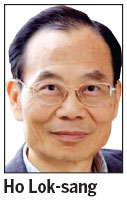Capital gains tax may help curb growing home prices
Updated: 2013-02-05 06:32
By Ho Lok-sang(HK Edition)
|
|||||||||

Recently, the International Monetary Fund warned that Hong Kong's high housing prices pose serious danger to the economy. According to Demographia, an Illinois-based consulting company, Hong Kong remains the world's most expensive housing market, with homes costing 13.5 times the median annual income (before tax), up from 12.6 a year ago. This is much higher than Australian homes, which costs only 6.5 times median income, yet are similarly labeled "severely unaffordable" by the survey.
A fairly common view is that the government should introduce measures to strike down housing prices so they become affordable. But striking down the prices with draconian measures will not magically increase supply. The measures end up clamping down demand haphazardly. For example, one possible way to help those who are waiting to buy might be turning existing owners into negative equity "owners", and to have banks foreclose and sell the properties cheaply to those who are waiting to buy. This has happened before. Fair-minded people know that this is both unfair and costly to society.
Other people have come up with the idea of a mortgage tax, so that the mortgage payments become so burdensome that buyers lower their bids. This will certainly hurt the owners/sellers, but cannot benefit the buyers, because a mortgage tax cannot improve affordability.
Still other people have come up with the idea of a vacancy tax, to force owners who are keeping their units vacant into selling. But the impact on actual supply would be quite small. Presently the vacancy rate, according to the Secretary of Housing and Transport, is only 4 percent, which is a fairly healthy rate and not excessively high. Although some developers have kept units off the market, others are selling units that have not yet been completed. Moreover, it would be very costly for the government to tax owners who have bought their units from developers and keep their units vacant.
Accordingly, there is, in point of fact, not much that can be done to help homebuyers buy homes in the short term. The government is already doing its best to enhance supply to meet long-term demand. Trying to clamp down home prices one way or another goes against the market and cannot be justified.
Instead of striking down home prices with draconian measures, the government could instead favor first-time buyers by availing them to a higher loan ration, which would make them more like investors or those who already own homes. The Hong Kong Monetary Authority has already moved in this direction and can do more.
Thus an across-the-board "demand management" (i.e. cutting demand) initiative will not help first time homebuyers. Demand management that helps first-time homebuyers must favor them at the expense of other homebuyers/investors. But arbitrarily punishing other homebuyers/investors really goes against the principle of protection of private property, which has been enshrined in the Basic Law.
Instead of a vacancy tax, I would propose putting a cap on rates relief/concession on all residential properties owned by one owner rather than allowing a separate concession to apply to each of the properties owned. At the same time, disallowing homes owned by a company to enjoy the concession may also increase the cost of hoarding many residential properties.
Finally, the government could also consider the introduction of a capital gains tax on properties that are paid on the realization basis. This is not so much to strike down the home prices as to make our tax system fairer. The government has been far too generous to the landowning class, who has reaped huge fortunes, largely at the expense of entrepreneurs and renters. A capital gains tax payable on realization of the capital gains, with exemption for owner-occupiers, would be both fair and efficient-provided that an annual allowance for inflationary gains ensures that purely inflationary gains are not taxed. To make things simple, I recommend an annual 10 percent gain to be exempt from the capital gains tax. The tax revenue collected could be spent on various social and infrastructure projects that benefit the community as a whole. Economic theory tells us that such taxes will not burden tenants, and allow the government to reduce profits tax rates, giving the economy a big push.
The author is Director, Centre for Public Policy Studies, Lingnan University.
(HK Edition 02/05/2013 page1)